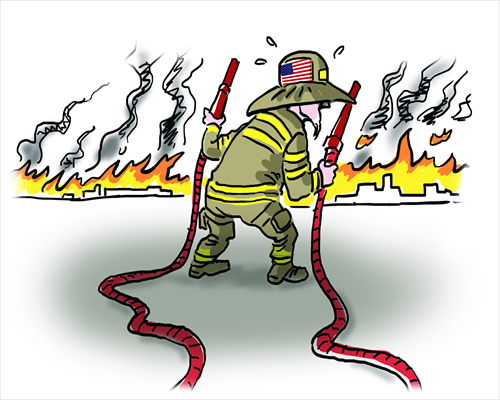US faces only uncomfortable choices in Iraq

Illustration: Liu Rui/GT
The first term of US President Barack Obama was not dominated by many foreign policy issues. The Libya bombardment constituted the only significant exception but even in that case the role of Washington was secondary in comparison to its Western allies.
By contrast, Obama's second term has been marked by a rising number of international crises requiring specific responses. In particular, the civil war in Syria has been followed by the sharp divisions between the West and East in Ukraine and more recently by the success of the Islamic State in Iraq and Syria (ISIS).
The current quagmire in Iraq is the natural consequence of the US-led military campaign against the country 11 years ago. In spite of the public attempt by former UK prime minister Tony Blair to disengage the 2003 invasion from the ongoing chaos, the US victory seemed to be a Pyrrhic one from the very first beginning.
The cost of the war was unbearable, the number of casualties high and the slim odds of the practical implementation of a successful political plan evident. Instability, not only in Iraq but also in the greater region of the Middle East, is the main element left behind after the regime of Saddam Hussein was toppled.
Obama is not responsible for the legacy of his predecessor George W. Bush. His foreign policy approach has been relatively different, while in 2011 he kept his pre-election promise proceeding with the withdrawal of US troops from Iraq.
Developments, however, have put him in an awkward position three years later. Responding to the advance of ISIS, he decided to send approximately 300 military advisers to the country to protect, inter alia, the US embassy in Baghdad. He is also considering further concrete steps in his attempt to stabilize the situation in Iraq.
Several think tanks and neoconservative scholars put pressure on Obama to use force in order to immediately defeat ISIS. In parallel with this, a plethora of options are currently discussed in the US, highlighting the increasing confusion.
Opinions vacillate from using manned or unmanned air forces to sending again special operation ground forces to Iraq.
Also, some analysts encourage Washington to approach Tehran and enhance mutual cooperation against ISIS. Others either advocate for the breakup of Iraq into separate states or focus on the need to cut the financing of the organization coming allegedly from Kuwait, Saudi Arabia and Qatar.
US public opinion is skeptical of Obama's ability to efficiently deal with the new Iraq crisis. A recent poll demonstrates that 58 percent of respondents disapprove of his foreign policy and that 67 percent believe he has not clearly explained US goals in the country. All in all, the trauma of the 2003 war cannot be easily forgotten by US citizens who saw almost 4,500 of their compatriots lose their lives on the battleground of Iraq.
Within this context, the president risks disappointing US citizens by possibly intervening again in Iraq as well as producing a counter-productive outcome with his tactics.
The experiences of the US military presence from 2003 until 2011 outline that its role can be a severely limited one at best in opening the way to safety and prosperity. Additionally, air strikes have been tested in other countries, such as Libya, without offering a viable solution to the problem.
In the final account, even if ISIS is eliminated by force, another similar organization might be reborn from the ashes in the near future, creating similar troubles for Washington.
The US cannot successfully act alone as an external superpower to critically influence developments in the greater Middle East, as it had happened in the past. As long as borders in the region are passing through a stage of reorganization due to ongoing sectarian and religious conflicts, the geopolitical balance will be largely shaped by local powers.
This leaves Washington with two options: to harmoniously cooperate with them and to allow its regional allies to play a bigger role.
The author is a research fellow at the Hellenic Foundation for European and Foreign Policy. opinion@globaltimes.com.cn